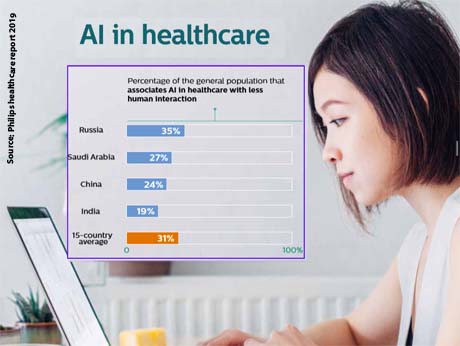
Amsterdam, The Netherlands, August 27 2019: Global leader in health technology, Philips has its Future Health Index (FHI) 2019 report: ‘Transforming healthcare experiences: Exploring the impact of digital health technology on healthcare professionals and patients’ .
The report reflects independent research, commissioned by Philips, of what is required to accelerate the shift from volume-based to value-based care in the global drive for sustainable healthcare systems.
Now in its fourth year, the report focuses on the role digital health technology plays in improving both the individual citizen and the healthcare professional experience – two elements of the ‘Quadruple Aim’ in healthcare. The FHI finds that, despite the majority of individuals wanting access to their digital health record (DHR) and being prepared to share it more widely with healthcare professionals, insufficient data sharing currently takes place. This is especially true for data collected by individuals themselves. While around two-fifths of healthcare professionals recommend that patients track health data, such as their blood pressure (44%) or weight (39%), only 9% said that most or all of their patients share this data with them on an ongoing basis.
India-specific findings
The study reveals that India is a forerunner in the adoption of digital health technology with 76% of healthcare professionals in the country already using digital health records (DHRs) in their practice. Interestingly, India meets the 15-country average when it comes to the usage of AI within healthcare at 46%.
Says Rohit Sathe, President, Philips Healthcare, Indian Subcontinent: "Philips’ Future Health Index 2019 report confirms that digital health technology is a pivotal pillar in delivering value-based care across the healthcare continuum in India. Tools including telehealth and adaptive intelligence (AI) solutions can help lower the barriers between hospitals and patients, thereby improving access to care and enhancing overall patient satisfaction, particularity in tier II & III cities in India. We hope that the insights from this report will assist key stakeholders in designing and implementing robust and sustainable health systems in the country.”
Key findings
For some of the key technologies examined, India is on par with the 15-country average – particularly digital health record (DHR) adoption and use of AI technologies
When Indian healthcare professionals are supported by digital technology, their experience improves
Encouraging broader use of telehealth is needed in India to revolutionize healthcare
The report reflects independent research, commissioned by Philips in 15 countries, in which India was included. It is based on the assessment of care delivery against the Quadruple Aim (better patient outcomes, improved patient experience, improved staff satisfaction, and a lower cost of care) with a focus to build sustainable healthcare systems.